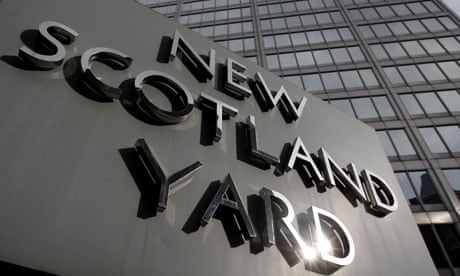The extent of police intelligence records about people who have not been charged or convicted of any crime has been revealed under the Freedom of Information Act.
The disclosures show that around 14m Metropolitan police intelligence reports and 38m from other forces, gathered routinely because they may prove useful, are being made available to all of Britain's police agencies on the Police National Database (PND). Figures obtained by the Guardian show the PND – in 2011 – contains at least 317.2m records.
The Met intelligence files includes details about protesters who have attended demonstrations, unconvicted "persons of interest", associates of criminals, including lists of phone numbers stored on perpetrators' phones, allegations of crimes, and victims of sexual or domestic abuse. The database also contains almost 40,000 images.
Police argue that sharing intelligence on the database speeds up investigations, helping identify new patterns of crime. But civil liberties groups are concerned that it can criminalise innocent people.
The revelation has prompted calls for more police transparency about what kind of information about unconvicted people is being logged and shared.
"This has a profound impact on privacy and basic rule of law," said Guy Herbert, general secretary of NO2ID. "If something is 'intelligence' it is by definition composed of guesswork, speculation and hearsay. It has the capacity to criminalise the innocent and affect people's lives in all sorts of ways if they get flagged as 'of interest' to the police."
Before being entered on to the PND, Met intelligence records are entered on a Scotland Yard database named Crimint Plus, described as "the largest law enforcement intelligence system in the world" by former Met detective chief inspector Peter Ship. An estimated 2,000 reports are entered every day on Crimint, which was established in 1994 and since 2005 has doubled in size. Most Crimint intelligence records are stored for a minimum of six years in accordance with police data retention policy. They are accessible by around 40,000 Met employees, plus up to 12,000 from 65 forces and agencies across Britain through the PND – though some information deemed sensitive is held more securely and cannot be accessed by all users.
Managed by the National Policing Improvement Agency (NPIA), the PND was introduced following recommendations from the Bichard inquiry into police failings prior to the Soham murders in 2002. The agency, which is expected to hand over control of the PND to the new police ICT company soon, has acknowledged that the system could contain information on up to 15m people – one in four of all Britons. According to the Metropolitan Police Authority website, intelligence gathering "may appear to be only for organised crime or counter-terrorism work, but it is actually often a more routine matter in the MPS. It could be described as simply 'capturing information while carrying out one activity which is likely to prove useful in a future policing activity'."
A Met spokesman said the force gathered information lawfully and within strict guidelines, but was "not prepared to discuss specific aspects relating to intelligence".
An NPIA spokesman said: "Each individual police force as the data owner will decide what information is stored on the PND. The public has a right to expect the police to share intelligence information to prevent and detect crime and to protect our communities. Under the Data Protection Act, individuals can access information about them that is held on the PND."
Are you on the Police National Database without a criminal record? Share your story here

Comments (…)
Sign in or create your Guardian account to join the discussion